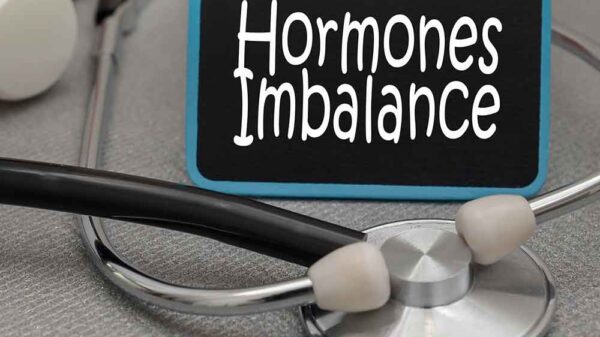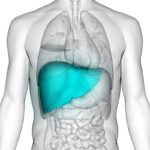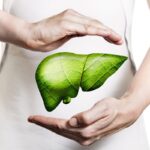When it comes to sex hormone imbalance, female hormones tend to receive more attention. However, men can experience hormone imbalances as well. As is the case with women, hormone imbalance in men is associated with unpleasant symptoms and a higher risk of fatty liver disease.
If you’re a man and suspect you may have a hormone imbalance, you will most likely exhibit certain signs and symptoms. Keep reading to find out the signs of hormonal imbalance, the connection between sex hormones and fatty liver disease, and what you can do to support hormonal health.
Functions of Hormones in Men
Testosterone is the primary sex hormone in men, though it may come as a surprise that estrogen plays an important role in men’s hormonal health as well.
Testosterone is the most abundant sex hormone in men and is responsible for defining male characteristics such as a deep voice, facial hair growth, and increased muscle mass.
Estrogen influences sexual function by regulating sex drive and sperm production.
Symptoms of Hormonal Imbalance
Having imbalanced levels of testosterone and estrogen can cause many uncomfortable symptoms.
If you’re a man with low testosterone levels, you may be experiencing:
- Sleep disturbances and difficulty sleeping
- Low sex drive
- Loss of sexual function, like erectile dysfunction
- Decrease in muscle mass
- Changes in hair growth, including a decrease in body hair and hair loss
- Depression and lack of drive
High estrogen may result in many of the same symptoms as low testosterone. Other symptoms may include:
- Gynecomastia, which refers to the development of breast tissue
- Infertility
High estrogen may also contribute to an increased risk of prostate cancer.
Role of Estrogen and Testosterone Imbalance in Fatty Liver Disease
The endocrine system is closely related to fatty liver disease.
Interestingly, male hormone imbalance is associated with a higher incidence of fatty liver disease, though the mechanism of risk is different than that for women. Research demonstrates that while high testosterone in women is a risk factor for developing fatty liver disease, high testosterone in men is a protective factor against developing fatty liver disease.
A study conducted by researchers at the Department of Internal Medicine at the University of Hawaii and the Department of Internal Medicine at the Bassett Medical Center and Columbia University College of Physicians and Surgeons evaluated the connection between sex hormones and nonalcoholic liver disease. Results showed that men with fatty liver disease had lower levels of testosterone. Moreover, having higher levels of testosterone decreased the risk of fatty liver disease in men and increased the risk of fatty liver disease in women. (1)
Studies also show that hypogonadism is correlated with fatty liver disease. Hypogonadism refers to the inactivity of the gonads, which are the organs that produce sex hormones. This, in turn, leads to lower levels of testosterone and estrogen. A study conducted by researchers at the First Department of Obstetrics and Gynecology at Aristotle University in Greece found that men with hypogonadism were at a higher risk of having fatty liver disease. (2)
On a molecular level, estrogen and testosterone impact liver functions. Moreover, both fatty liver disease and hormone production are influenced by the presence of excess body fat and metabolic syndrome. Estrogen is converted to testosterone in adipose tissue, which is stored fat throughout the body. Increased adipose tissue can contribute to the production of excess estrogen in men. (3)
The Decline of Testosterone with Age
Women aren’t the only ones who experience age-related decreases in hormone production, which occurs during a time called menopause. Men experience the male equivalent of menopause, also called “male menopause” or “andropause,” during which their testosterone production decreases starting around middle age.
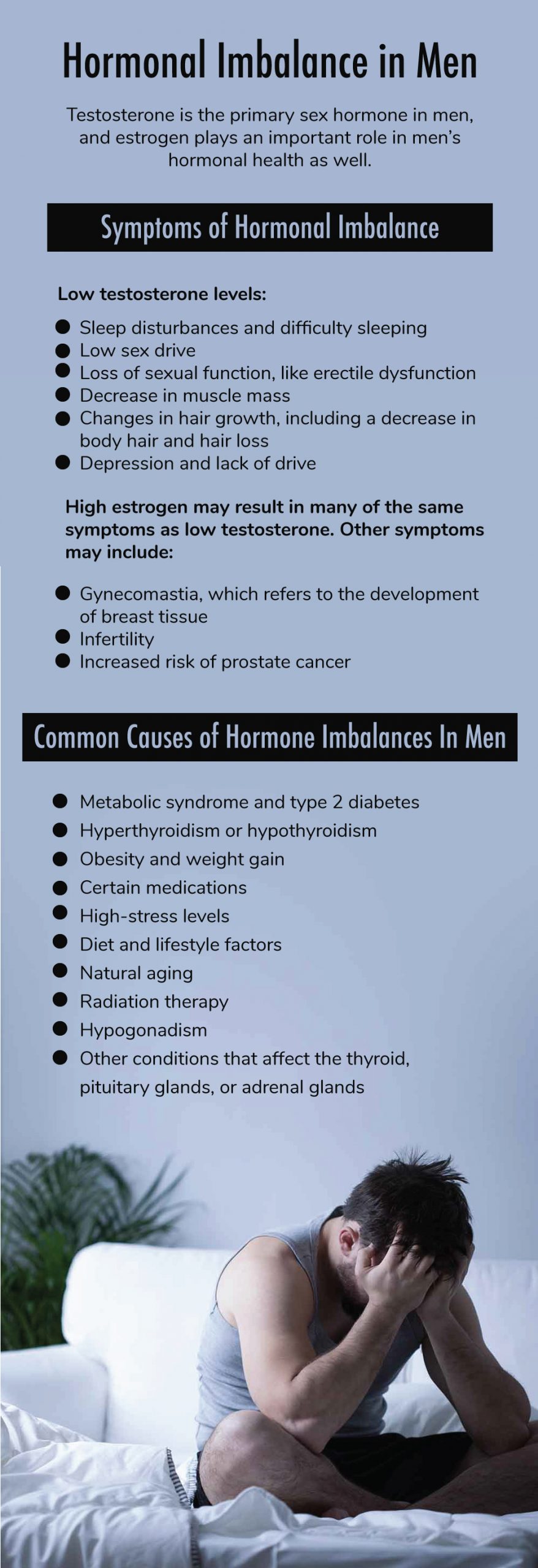
Make an Appointment with Your Doctor
If you’re experiencing symptoms of a hormone imbalance, it’s a good idea to make a trip to your physician to ensure that a hormone imbalance is indeed the cause of your symptoms. If you’re diagnosed with hormonal imbalance such as low testosterone or high estrogen, your physician will likely evaluate you to determine the cause of abnormal hormone levels.
Common causes of hormone imbalances in men include:
- Metabolic syndrome and type 2 diabetes
- Hyperthyroidism or hypothyroidism
- Obesity and weight gain
- Certain medications
- High-stress levels
- Diet and lifestyle factors
- Natural aging
- Radiation therapy
- Hypogonadism, which describes the inactivity of reproductive organs that secrete sex hormones
- Other conditions that affect the thyroid, pituitary glands, or adrenal glands
Your doctor will go over treatment options with you, including medications for any underlying conditions and hormone replacement therapy. Testosterone replacement therapy.
Foods that Boost Testosterone and Lower Estrogen
In addition to medications to treat underlying conditions associated with male hormone imbalances, diet and lifestyle changes can be very effective for endocrine health.
If you’re looking for how to lower estrogen in men or increase testosterone in men, here are foods you should incorporate into your diet.
1. Lentils
Lentils are excellent sources of protein, fiber, iron, and vitamin B6, as well as the testosterone-boosting mineral zinc. A study conducted by researchers at Wayne State University School of Medicine in Michigan found that increased zinc intake may support testosterone synthesis. (4)
Other foods with lots of zinc include oysters, crab, beef, tofu, mushrooms, and oats.
2. Soy
Let’s first dispel the myth about soy increasing estrogen. It was once thought that the phytoestrogens in soy mimicked the biological activity of hormonal estrogen. However, recent research shows that soy products may actually be estrogen blocking foods. The phytoestrogens present in soy serve to compete with estrogens for estrogen receptors. Because phytoestrogens occupy some of the receptors, this serves to decrease the activity of biological estrogen. Tofu is a great option for getting phytoestrogens, as well as zinc.
3. Flaxseeds
Flaxseeds are high in protein, fiber, and antioxidants, as well as phytoestrogens. In addition to anti-estrogen activity, flaxseeds have also been shown to attenuate indicators of metabolic syndrome such as high cholesterol and high blood pressure.
4. Salmon
Salmon is rich in omega-3 fatty acids that play a role in reducing systemic inflammation and helping reverse liver damage.
A study conducted by researchers at the Division of Endocrinology and Metabolism at the Medical University of Graz in Austria found that for a study sample of 165 men, vitamin D supplementation was correlated with increased testosterone levels in comparison to the control group. (5)
Other foods high in vitamin D include egg yolks, cheese, tuna, and fortified products like soy milk. In addition to dietary vitamin D, sun exposure triggers your skin to synthesize vitamin D. To increase your vitamin D levels, try getting 15 minutes of sun exposure each day.
5. Greek Yogurt
Greek yogurt contains lots of probiotics that promote gut health as well as protein that affords optimal ratios of essential amino acids. Essential amino acids are building blocks of protein and are critical to building muscle and maintaining muscle mass. The body requires more essential amino acids during periods of stress.
Investigations published in Nutrients and conducted by researchers at the University of Arkansas for Medical Sciences and the U.S. Army Research Institute of Environmental Medicine assessed the connection between testosterone, stress response, and essential amino acids. (6) Researchers concluded that essential amino acids are a supportive part of restoring hormonal health and maintaining muscle mass that is critical to biological resilience during stress. (6)
Eating high-quality protein with ideal ratios of essential amino acids may be an important part of building muscle, losing weight, and normalizing hormone levels. Other food sources that provide optimal ratios of essential amino acids include chicken, lean beef, nonfat yogurt, and low-fat cheese.
Avoid Refined Sugar
Refined sugar refers to sugar that has been removed from its original source – like sugar cane and fruit – and added to processed foods like soda, juice, cakes, cookies, and other processed or packaged items. These sugars wreak havoc on hormone levels, including insulin, thyroid hormones, and sex hormones.
The impact of refined sugar intake on male sex hormones is confirmed by science. Researchers at the Guangdong General Hospital in China investigated the relationship between sugary beverage consumption and testosterone levels among 545 American men. (7) Results revealed that drinking sugary beverages was significantly correlated with low testosterone levels. (7)
The Importance of Exercise and Weight Loss
Obesity and metabolic syndrome are factors associated with hormonal imbalance. Insulin resistance accompanies obesity and metabolic syndrome and can lead to suboptimal hormone production.
Strength training will help you maintain lean muscle mass while supporting a healthy stress response. Plus, having more muscle mass increases your metabolic rate, helping you shed pounds.
Aerobic exercise strengthens the cardiovascular system by improving heart function and improving vasodilation throughout blood vessels. This, in turn, lowers blood pressure and decreases the risk of heart attack or stroke.
Regulating Stress Levels
Stress can elicit unfavorable hormonal responses that can lead to hormone imbalances. The stress response triggers your adrenal glands to produce epinephrine and norepinephrine. A chronically elevated stress response also increases levels of cortisol which can lead to systemic inflammation that can play a role in impacting your other hormones.
Managing stress is a critical part of returning your hormones to healthy levels. To effectively manage stress, make sure you get adequate sleep and set aside a little time each day for a stress-relieving activity. This may mean that you practice a few minutes of meditation, read a favorite book, practice yoga, or practice deep breathing techniques.
Conclusion
Hormone imbalances can occur in men and have repercussions for physical health and mental health. If you are experiencing symptoms of low testosterone or high estrogen, talk to your doctor about hormone imbalances. If you have fatty liver disease, you are also at a higher risk of having low testosterone and high estrogen. Following a diet and lifestyle that promotes hormone balance and liver health will get your hormonal health back on track.
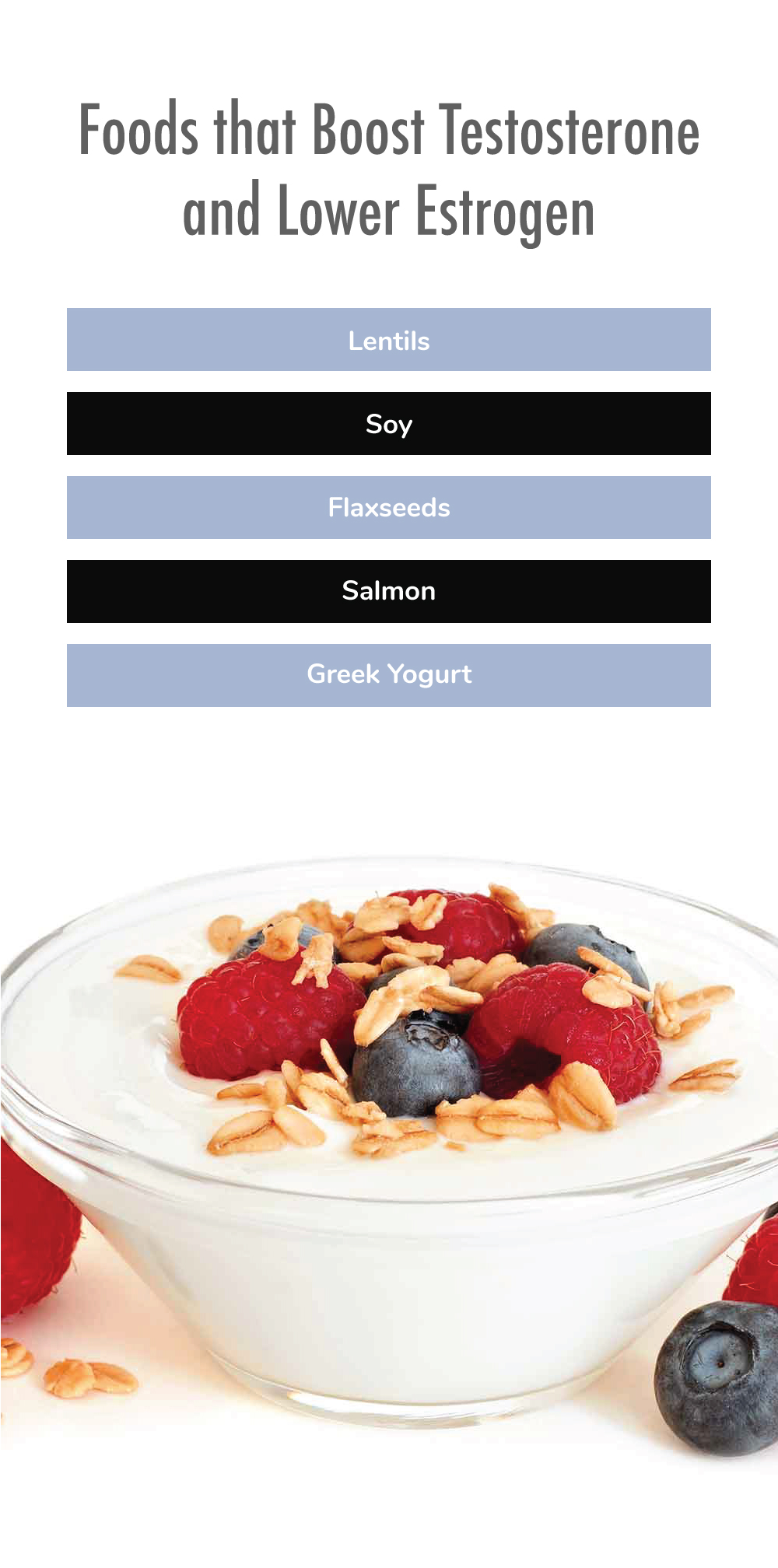
References:
(1) https://www.ncbi.nlm.nih.gov/pubmed/28425408
(2) https://www.ncbi.nlm.nih.gov/pubmed/27879963
(3) https://www.ncbi.nlm.nih.gov/pmc/articles/PMC4600502/
(4) https://www.ncbi.nlm.nih.gov/pubmed/8875519
(5) https://www.ncbi.nlm.nih.gov/pubmed/21154195



